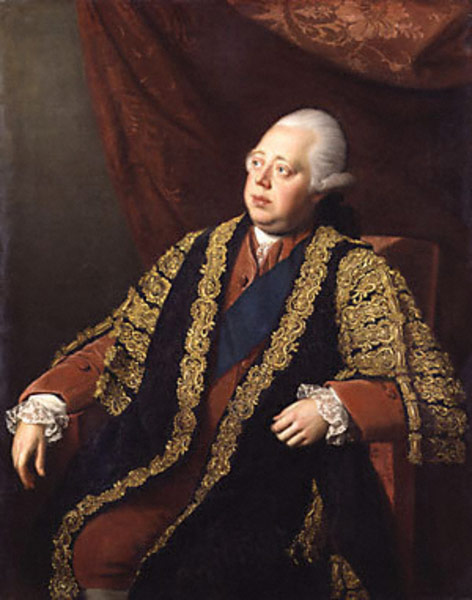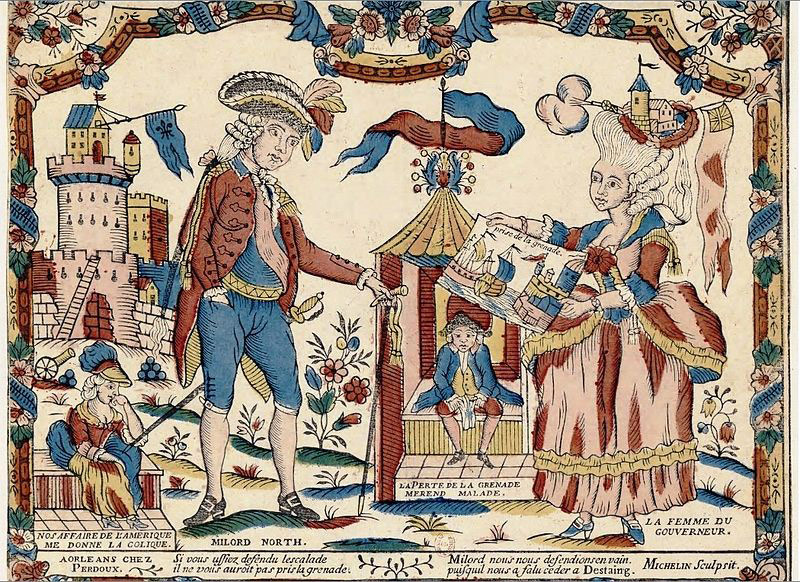 Frederick North was fondly referred to as the Earl of Guilford and a one-time Prime Minister of Great Britain who led Great Britain during the American War of Independence (1775-1783). He was politically motivated from childhood and went on to hold a number of esteemed posts in the British Parliament during his political career. Posts ranged from the Lord of the Treasury (1759-1765), Chancellor of the Exchequer (1767-1770) and the prestigious Prime Ministerial post (1770-1782). Frederick North was often known as “Lord North”, a courtesy title bestowed upon an individual by the Sovereign Monarchy of Great Britain. He was infamously remembered as the man or Prime Minister “who lost America”.
Frederick North was fondly referred to as the Earl of Guilford and a one-time Prime Minister of Great Britain who led Great Britain during the American War of Independence (1775-1783). He was politically motivated from childhood and went on to hold a number of esteemed posts in the British Parliament during his political career. Posts ranged from the Lord of the Treasury (1759-1765), Chancellor of the Exchequer (1767-1770) and the prestigious Prime Ministerial post (1770-1782). Frederick North was often known as “Lord North”, a courtesy title bestowed upon an individual by the Sovereign Monarchy of Great Britain. He was infamously remembered as the man or Prime Minister “who lost America”.
Background
He was part of a political family with middle class roots on the economic front. He was born on April 13, 1732 in London to Francis North and Lucy Montagu and was the eldest of six children. He had a decent education ranging right from his formative years at Eaton (1742-1748) and a stint at Trinity College Oxford where he was awarded a prestigious M.A. degree. He subsequently moved to Europe thereafter where he studied at the university in Liepzig.
Frederick North married a lovely lady called Anne Speke, daughter of a Somerset landowner with whom he had 7 children. Nothing much is known about Frederick North’s employment career as he dwindled in politics from his early days.
Early Political Career
North jumped into the well of politics at a tender age of 22 when he was elected unopposed as a Member of Parliament for the Constituency of Barnbury in the 1754 where he served until 1790. He then went on to join the government in the capacity of a “Junior Lord of the Treasury”. He enhanced his reputation as an excellent administrator and parliamentarian, immensely popular with his colleagues and contemporaries to a certain extent. He was instrumental in expelling John Wilkes, a Member of Parliament from the House of Commons in the year 1763 for a seething attack on the Prime Minister and King of Great Britain during this period. Frederick later fled to France for fear of his life due to threats posed by the wealthy Wig magnates that dominated the Ministry. He then returned to England in 1766, and was appointed as Joint Paymaster of the Forces and a Privy Counselor at the same time.
He rose to the post of Chancellor of the Exchequer in 1767 and became the Leader of the Commons as well in 1768. The political highlight of Frederick North’s career was being elected to the prestigious post of Prime Minister, which he served for a period of twelve years (1770-1782).
American Revolutionary War (1775-1783)
The American Revolution was the most significant event of North’s highly acclaimed political career. Frederick North would probably go down in history as the man or Prime Minister who lost the American colonies. During this period his government focused on growing problems within American economies and later conducting the American War of Revolution which broke out in 1775. During this period, Frederick North captured New York and Philadelphia but was unable to secure a decisive victory. Proposed legislative measures intended to punish the Bostonians for the infamous Boston Tea Party backfired. These legislative measures were part or known as Coercive Acts in Great Britain and Intolerable Inhuman Acts in American colonies. Frederick North and his administration were visibly upset by the loss of American colonies, though they were partly to blame by their infamous tax policies. He reviewed the Boston Tea Party riots of 1773 as a challenge to the Monarchy and retaliated by introducing an unethical punitive legislation in American colonies aimed at installing fear. He went one step further by shutting down the inefficient Boston government and cutting of trade in the view of maintaining peace and suppressing the rebellion.
Shortcomings of the War
Long-time allies like France, Spain and the Dutch republic switched loyalties and rallied around the American rebel forces to fight against the British forces. Soon the British forces found themselves in a hopeless situation in terms of fighting a global war on 4 continents without any friends or allies. During this war, Frederick North incorporated traditional home-grown British policies of increased severity and conciliation which further backfired.
As the war progressed, he was reduced to a sight of despair and hope. Hope of reconciliation went out of the window and garnering renunciation at the ultimate sacrifice became his motto during the American War of Independence. A shocking defeat at Saratoga added further insult to injury. At this time, he offered to resign from his services but probably an inflated ego egged him on. One of his major shortcomings was indecision during critical moments.
Further defeat and surrender of Yorktown forced him to fundamentally reconsider his policies, which was a little bit too late at this time. During the war, Britain was forced to divide its attention to the sugar rich West Indian colonies. The West Indian colonies were a major source of revenue to the Monarchy and were under major threat of a French and Spanish invasion, thereby the Sovereign Monarchy were busy fighting a war on different continents, leading further to their downfall in the American Revolutionary War.
Resignation & Aftermath
 Frederick North holds an uncanny distinction of being the first British Prime Minister to be forced out of office, courtesy his failure of protection of the Sovereign Monarchy during the American Revolutionary War. He proposed a Conciliation Plan much to the dismay of American colonies and was eventually hunted out of office. It was even suggested that Lord Frederick North be brought to public trial for his inability to safeguard the Sovereign Monarch which was later called off. Later naval victories at the Battle of the Saintes had little effect as the government had already been ruled out of office. In 1783, Frederick North returned to power as Home Secretary but was forced out once again by King George III. He harbored further political ambitions thereafter which were eventually sniffed out by the new Prime Minister, William Pitt. Frustrated, Frederick North resigned from his parliamentary seat in 1790 as he turned blind. He went onto succeed his father as the Earl of Gilford and spent his final years in the House of Lords before peacefully passing away in 1792.
Frederick North holds an uncanny distinction of being the first British Prime Minister to be forced out of office, courtesy his failure of protection of the Sovereign Monarchy during the American Revolutionary War. He proposed a Conciliation Plan much to the dismay of American colonies and was eventually hunted out of office. It was even suggested that Lord Frederick North be brought to public trial for his inability to safeguard the Sovereign Monarch which was later called off. Later naval victories at the Battle of the Saintes had little effect as the government had already been ruled out of office. In 1783, Frederick North returned to power as Home Secretary but was forced out once again by King George III. He harbored further political ambitions thereafter which were eventually sniffed out by the new Prime Minister, William Pitt. Frustrated, Frederick North resigned from his parliamentary seat in 1790 as he turned blind. He went onto succeed his father as the Earl of Gilford and spent his final years in the House of Lords before peacefully passing away in 1792.